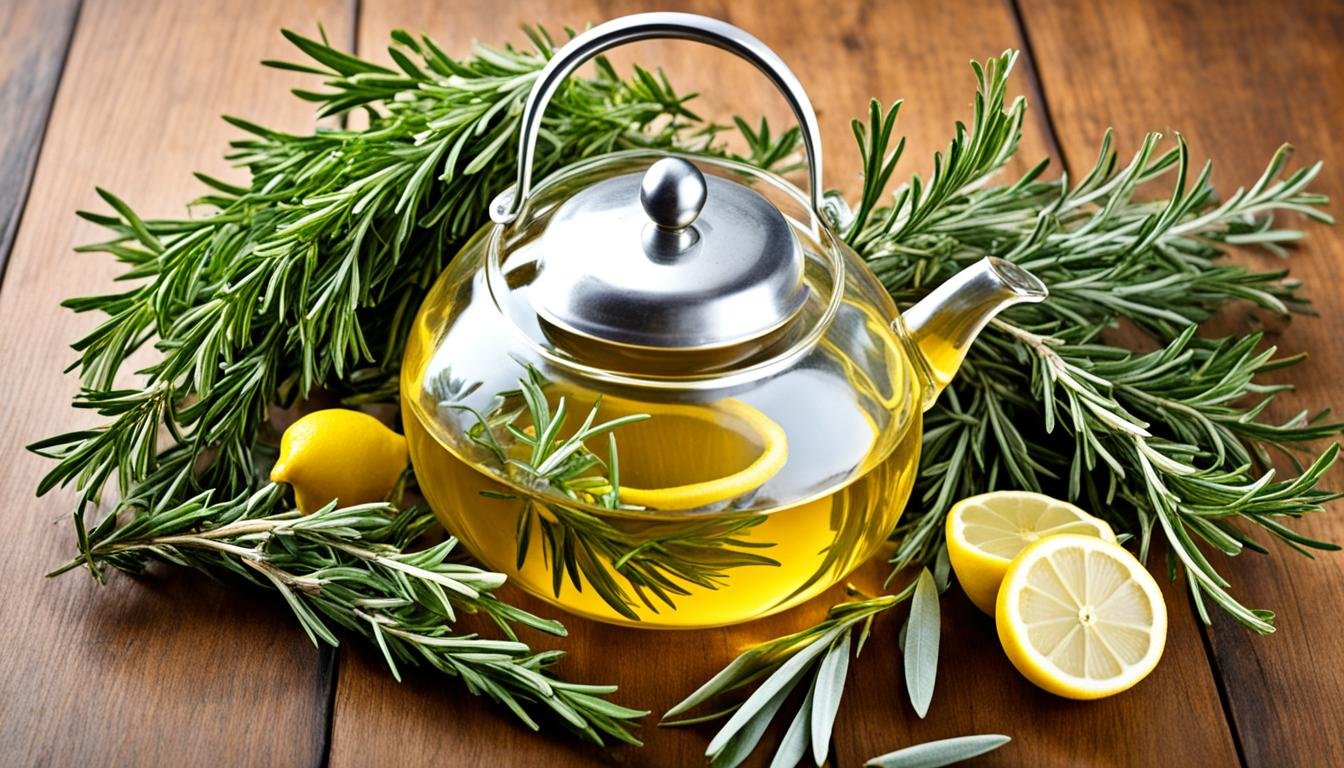Urinary tract infections (UTIs) are a widespread problem, affecting over 150 million people each year. The most common bacteria causing them is E. coli. However, sometimes other bacteria are the culprits.1 Women have a higher risk than men, with around 40% getting a UTI at some point. Symptoms include pain when peeing, frequent urges to go, and cloudy or bloody urine.
Although UTIs can usually be fixed with antibiotics, they often come back. Using too many antibiotics can be harmful in the long run. It may kill off the good bacteria in the body and lead to antibiotic resistance.1 Luckily, almost half of UTIs can go away on their own. Because of this, people look for natural ways to feel better. This article introduces teas that might soothe UTI symptoms and suggests which teas to try.
Key Takeaways
- Urinary tract infections (UTIs) are a common bacterial infection affecting over 150 million people worldwide each year.
- Women are 30 times more likely to develop a UTI than men, with 40% experiencing a UTI at some point in their lives.
- Up to 42% of mild and uncomplicated UTIs can be resolved without antibiotics, leading many to seek natural remedies.
- Certain teas, such as D-mannose, uva ursi, garlic, and cranberry, may help relieve UTI symptoms and support the body’s healing process.
- It’s important to consult a healthcare professional before using any natural remedies, especially for those with underlying health conditions or taking medications.
Introduction to UTIs
Urinary tract infections (UTIs) are very common bacterial infections. They affect over 150 million people yearly.2 The most usual culprit is E. coli. However, sometimes other bacteria types are to blame.3 Women are much more likely to get UTIs than men. About 40% of women will have at least one UTI in their lifetime.
Prevalence of UTIs
UTIs are among the top infections doctors see in the primary care setting.2
Causes of UTIs
Several things can raise UTI risk. These include not peeing when you need to, not emptying your bladder fully, and using condoms.2 A diet rich in fruits and veggies helps the immune system and promotes health. Things like caffeine, sugars, tobacco, alcohol, and food additives can irritate the bladder.2
Symptoms of UTIs
UTIs can attack different parts of the urinary system. This includes the urethra, bladder, ureters, and kidneys. But, they usually start in the bladder or urethra. Symptoms may include a burning feeling while peeing, needing to pee a lot, and cloudy, dark, or bloody urine. You might also feel tired, get a fever, or have pain in the pelvis, stomach, or back.
Benefits of Tea for UTI Relief
Teas made from certain herbs and vitamins can be great for UTI relief. Research shows up to 42% of mild UTIs can go away without antibiotics. If you’re looking to avoid too many antibiotics, tea might help.1
Many teas have properties that fight off bad germs and reduce swelling. These benefits can ease UTI symptoms. Remember, always follow your doctor’s advice, especially if you need antibiotics.
Natural Remedies for UTIs
Over 150 million people get UTIs every year. They are more common in women. In fact, women are 30 times more likely to get a UTI than men. About 40% of women will have a UTI at least once in their lives.1
UTIs can come back, so many look for natural ways to avoid too many antibiotics.1
Antimicrobial and Anti-Inflammatory Properties
Many teas have properties that can fight UTIs. They might stop bad germs from growing and reduce swelling. This could help your body heal naturally.1
In some cases, teas alone can treat mild UTIs without needing antibiotics. The anti-germ and anti-swelling effects of certain teas are proven.1
D-mannose Tea
D-mannose is a natural sugar used to fight off and treat minor UTIs.1 It stops certain harmful bacteria, like E. coli, from sticking to the bladder walls. This makes it easier to remove them before an infection starts.1
How D-mannose Works
In 2016, a study looked at 43 women with UTIs who often got them again. They took 1.5 grams of D-mannose twice a day for 3 days, then once a day for 10 more days.1 Around 90% of them saw their infections go away.1
Research on D-mannose for UTIs
A different study in 2013 involved 308 women. It tested a daily 2-gram dose of D-mannose against a common UTI antibiotic. The results showed D-mannose was just as good at preventing UTIs, with less trouble.1
Dosage and Side Effects
For most, D-mannose is safe, but some might get mild diarrhea.1 Since it’s a sugar, those with sugar level issues should be careful.
Uva Ursi (Bearberry Leaf) Tea
Uva ursi is an herbal remedy helpful for UTIs. It’s been part of traditional medicine for a long time. The tea is made from the leaves of the uva ursi plant. It is dried and steeped. The key healing ingredient in uva ursi is arbutin. This has strong effects against E. coli, a common UTI cause.4
Antimicrobial Compounds in Uva Ursi
Uva ursi can help fight infections because it contains arbutin and hydroquinone. It also has tannins that work as astringents.4 These compounds can stop bacteria that cause UTIs.
Research on Uva Ursi for UTIs
But, there’s not a lot of research backing uva ursi for UTIs. One study of 57 women showed it helped lower UTI return when paired with dandelion root. This was more effective than a placebo.4 A study with over 300 women found uva ursi wasn’t better than a placebo for treating UTIs.1 Some think uva ursi might work best early on in an infection. Yet, more studies are needed to be sure.4
Uva ursi should be used carefully. Daily doses of 200–840 mg seem safe, but not for more than 1–2 weeks. This is to avoid harm to the liver and kidneys.5 It’s mainly sold in its leaf or powder form.4 It’s not safe for children. Adults should talk to their doctors before taking it. Be careful if you’re taking lithium, medications that change urine acidity, NSAIDs, steroids, or iron supplements.4
| Compound | Mechanism of Action |
|---|---|
| Arbutin | Exhibits potent antimicrobial effects on E. coli, a common cause of UTIs |
| Hydroquinone | Contributes to uva ursi’s antimicrobial and anti-inflammatory properties |
| Tannins | Possess astringent effects that may help combat urinary tract infections |
Garlic Tea
Garlic is a well-loved herb. It’s been used for ages in cooking and healing. It fights off many kinds of infections due to allicin, a certain compound. Allicin is known for its strong power against bacteria, like the ones causing UTIs and E. coli.1
Allicin and Antibacterial Effects
There’s word that garlic might help treat UTIs. But, solid research backing this is still missing.1 Still, studies show that allicin in garlic can take on E. coli, a common source of UTIs.1
Precautions with Garlic Supplements
Garlic pills are often okay, but they can cause heartburn and make your breath and sweat smelly. Be careful if you’re allergic to garlic, onions, or leeks. It’s a no-go if you are, and if you’re on blood thinners or certain HIV drugs.1
Cranberry Tea
Cranberries are popular for fighting UTIs naturally. They have D-mannose, hippuric acid, and anthocyanins. These can stop bacteria from sticking in the urinary tract. This helps stop infections from growing.6 But, a 2012 review says there’s not enough proof that cranberries fight UTIs.6 In 2019, another review found that cranberries lower UTI chances and symptoms for some people. Yet, they’re not the best choice.
Compounds in Cranberries
Cranberries have many helpful compounds. D-mannose, hippuric acid, and anthocyanins help fight bacteria. They prevent infections from taking hold in the urinary tract.6
Research on Cranberry for UTIs
The 2012 review showed cranberries might not really fight UTIs. More research was needed.6 The 2019 review said cranberries can lower UTI rates and symptoms in some cases. But, D-mannose and the antibiotic fosfomycin work better.6
Dosage and Side Effects
For most people, cranberry products are safe. But they might upset your stomach. Drinking too much juice can lead to kidney stones and extra calories.6
Green Tea
Green tea comes from plant leaves and offers many health perks. It helps reduce anxiety and stress.3 Catechins in the tea protect healthy cells in parts like the bladder. They guard against inflammation.3 Also, green tea’s antioxidants can lower cell-damaging free radicals. They lessen inflammation too, good for anyone fighting a UTI.3
Antioxidants and Anti-Inflammatory Effects
Antioxidants and anti-inflammatory effects of green tea are great for tackling UTIs.3 Green tea’s catechins defend the bladder and mucosal tissues from harm.3 Plus, its polyphenols and antioxidants cut down on cell-damaging free radicals. This might reduce UTI pain and irritation.3
Bearberry Tea
Uva ursi, or bearberry, is a well-known treatment for UTIs. It’s been part of traditional medicine for ages. The leaves are turned into tea. It’s most useful against E. coli, a top UTI cause, thanks to arbutin.4
Arbutin and Antimicrobial Properties
Uva ursi has arbutin and hydroquinone, great at fighting infections. Studies in rats looked at its potential with enzymes and a protective effect against cystitis in some women.4
Preparation and Dosage
To make bearberry tea, soak 3 grams of leaves in 200 ml of water for 12-14 hours. Then, strain it and enjoy up to 4 cups daily.
Precautions with Bearberry Tea
Too much bearberry tea can be poisonous. So, only use it for UTIs for up to seven days. If it makes you nauseous or causes vomiting, stop using it.4 Reported side effects are usually mild. They can affect drugs like lithium and NSAIDs, making them less effective. Some people may get eye problems from too much uva ursi. In the lab, it shows it might help with inflammation in the skin.4
Goldenseal Tea
Goldenseal is known to help with UTIs. It has hydrastine and berberine, which fight off germs and reduce swelling.7 Berberine keeps bacteria such as E. coli from sticking to the urinary tract walls. This makes it easier for the body to get rid of them.7
Berberine and Antimicrobial Effects
Berberine in goldenseal is key for fighting UTIs. It can kill bacteria, especially E. coli.7 By stopping bacteria from sticking to the urinary tract, it helps the body push them out.7
Preparation and Dosage
To make goldenseal tea, put a teaspoon of the root powder in 250 mL of boiling water. Let it sit for 10-15 minutes, then strain and cool. Drink two to three cups daily.8 You can also use the liquid extract or capsules (450 mg, 2-3 times daily).8
What Tea is Good for UTI?
Besides the mentioned teas, other herbal types help with UTIs. These teas include1:
Corn Silk Tea
The thin, thread-like parts inside a corn husk are known as corn silk. It’s part of traditional medicine for UTI treatment. Corn silk has flavonoids and stigmasterol. These may ease UTI symptoms by fighting inflammation and bacteria.
Dandelion Tea
Dandelion is more than a weed; it’s a go-to in folk medicine for health issues. It’s a diuretic, so it boosts urine flow, cleansing the urinary system. Plus, it fights bacteria and reduces inflammation, tackling UTI causes.
Boxwood Tea
Boxwood, an evergreen shrub, has a special place in Chinese traditional medicine. It’s used for UTIs due to its berberine and evodiamine. These substances fight bacteria and reduce inflammation, helping heal UTI symptoms.
Horsetail Tea
Horsetail comes in, offering help for several urinary issues, UTI being one. It has silica, flavonoids, and saponins which work as a diuretic and fight bacteria. They also reduce inflammation, aiming to lessen UTI discomfort.
Other Herbal Teas for UTIs
There are also some other herbal teas good for UTIs.8
Parsley Tea
Parsley tea is great for UTIs.8 Drink it up to three times a day. It helps because it’s a diuretic and has antimicrobial properties. But, don’t drink it if you’re pregnant, or have issues with your kidney or heart.8
Hibiscus Tea
For treating UTIs, hibiscus tea can be really helpful.8 It fights bacteria and helps you pee more. Yet, it’s not good for kids under 12 or if you have kidney or liver problems, high blood pressure, or diabetes and take certain meds.8
Precautions and Considerations
When you use tea or natural products for a UTI, always talk to a healthcare expert first.1 They can help set the right dose for you. Remember, these teas aren’t a replacement for prescribed medicines.
Consulting a Healthcare Professional
Before trying herbal teas for a UTI, consult a doctor or health expert.1 They will check if it’s safe for you and your health needs. They’ll also make sure it won’t cause problems with any other medicines you take.
Warnings for Specific Groups
Not all herbal teas are safe for everyone.8 People with diabetes, liver, or kidney issues should be extra careful.1 This goes for pregnant or nursing women, children, and older adults too. Always get professional advice before trying these teas.
Duration of Use
Don’t use herbal UTI teas for more than 7 days in a row.8 Overusing them, especially bearberry and horsetail, may cause mineral problems or other issues.8 If you don’t feel better or if things get worse, see a doctor. Don’t rely only on teas.
Conclusion
Urinary tract infections (UTIs) are common and painful, affecting many people’s lives. Antibiotics are the usual first treatment. Yet, herbal teas can help too. Teas like those with D-mannose, uva ursi, garlic, cranberry, and green tea offer aid because they have properties that fight bacteria and inflammation.31
Before trying these teas, talking with a doctor or herbalist is important. This is especially true for anyone with health conditions or on other medicines. Remember, herbal teas are not a solo treatment for UTIs. They work best when used together with standard healthcare, guided by a professional’s advice.1
Uncovering the power of herbal teas for UTIs is an ongoing study. But, what’s clear is these teas can be a useful part of strategies to manage UTIs, with advice from a doctor. The idea is they can add to the traditional treatment, leading to better outcomes and comfort for those facing UTIs.319
FAQ
What are the most common symptoms of a urinary tract infection (UTI)?
Why are women more prone to developing UTIs than men?
Can UTIs be treated without antibiotics?
How does D-mannose work to help treat UTIs?
What are the potential benefits of uva ursi (bearberry leaf) for UTIs?
How can garlic help with UTIs?
What are the potential benefits of cranberry products for UTIs?
How can green tea be beneficial for UTIs?
What are the key compounds in goldenseal that make it helpful for UTIs?
Are there any other herbal teas that can be beneficial for UTIs?
What precautions should be taken when using herbal teas for UTI treatment?
Source Links
- https://www.healthline.com/nutrition/herbs-for-uti
- https://www.va.gov/WHOLEHEALTHLIBRARY/tools/urinary-tract-infections.asp
- https://www.ncbi.nlm.nih.gov/pmc/articles/PMC3684790/
- https://www.mountsinai.org/health-library/herb/uva-ursi
- https://www.verywellhealth.com/uva-ursi-health-benefits-4582831
- https://www.ncbi.nlm.nih.gov/pmc/articles/PMC7025796/
- https://www.itmedicalteam.pl/articles/natures-weapon-against-urinary-tract-infections-101236.html
- https://www.tuasaude.com/en/teas-for-uti/
- https://www.sciencedirect.com/science/article/abs/pii/S1744388118302639




